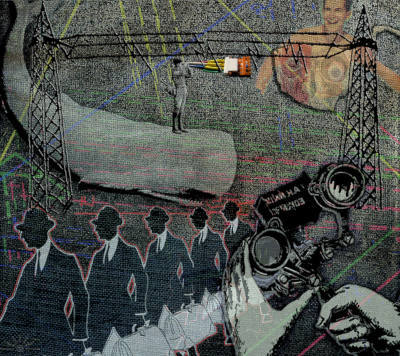In the days leading up to the 2018 AAA annual conference, Allegra Laboratory published an open call on Twitter for “a post on the conference, a panel, a discussion, or something you overheard in the corridors of the convention centre.” Allegra was called out for this post by several anthropologists, one of whom was Dick Powis, a graduate student at the Washington University in St. Louis, a co-founder of Footnotes Anthro, and driving force behind #hautalk. The conversation that took place provides us with an opportunity to examine the ways in which anthropologists engage in social justice efforts on social media, specifically the practice(s) of calling in/out. As a communications professional who has worked on the periphery of anthropology for several years — as a web producer for American Ethnologist, a once-hopeful applicant to PhD programs, and a communications specialist at the Arab American National Museum — I hope to offer my perspective as a social media writer and an outsider, looking in. I am calling for anthropologists to add calling in to their social media practice as they work towards equity and justice in their research, politics, and careers. For an excellent summary of calling in, see “Calling In: A Quick Guide on When and How” by Sian Ferguson.
Following Allegra’s call for submissions, the ethics of their request were promptly called into question. The reactions, though limited in number, were strongly worded condemnations of the final line in the tweet: “…something you overheard in the corridors of the convention centre.” The tweet began innocuously enough, with Allegra calling for “a post on the conference, a panel, or [a] discussion…” Powis’ response was part critique, part public shaming. The quoted tweet began with “Mind your own business,” and was punctuated at the end with a simple phrase, “Gross.” The question is, did Allegra’s tweet evoke a light-hearted attempt to catch readers’ interest, or, a blatant disrespect for privacy and consent? The reactions were generally divided along continental boundaries — North American anthropologists were calling Allegra out and their European counterparts were coming to the blog’s defense. Like most conflicts, this one seems to have deeper roots than a single conference, tweet, or blog post. As one anthropologist told me when asked about the interaction, many North Americans find European anthropologists to be class reductionists who are less concerned with matters of identity politics than their North American counterparts.
While public shaming is an effective tool for rallying like-minded individuals, it can similarly alienate potential allies.
Despite the difference between North American and European perspectives, anthropologists are still peers. Is the divide in the field so great that it is no longer worth a persuasive effort to critique each other without public shaming?
If we cannot make a good-faith effort to practice healthy, productive debate amongst ourselves, how can we expect to challenge oppressive behaviors outside of our professional circles?
A key feature of calling out is that an individual with less power is holding an entity with more power accountable. Allegra holds power as a leading anthropology blog that is widely read, but its team includes individuals who would hardly be considered senior academics, many of whom are part of the academic precariat. Powis, though a graduate student, also has power as a co-founder and frequent contributor to several anthropology blogs and a leading voice on #anthrotwitter. If Powis’ goal was to garner public support rather than change the behavior of Allegra, then his strategy worked well. It may also have further escalated existing tensions between some North American and European anthropologists. I wonder, however, how a good-faith effort to call in, rather than call out, would have affected the trajectory of the conversation.
The only way to know the original intent of a post is to ask the intent directly. In my experience as a communications professional, calling out is not an effective way to change the behavior of the person or publication in question.

By the same token, Allegra had ample opportunity to respond in good faith and clearly state if their post did or did not mean what it seemed to. If their tone was meant to be lighthearted, but was misinterpreted, Allegra should have said so. If they did mean to ask for pitches based on overheard conversations, then they should have come out and said so clearly and definitively. Leaving the intent of the tweet obscured does not add to their credibility in the matter. As a publication that holds a great deal of power, and as the original poster, Allegra is responsible for all of its (mis)communications. Taking a defensive tone and side-stepping the core issue is not likely to instill trust or confidence.
In my work managing social media for the Arab American National Museum, I have made mistakes, often poorly wording statements in an attempt to either make a tweet more interesting or cutting down a statement that exceeded Twitter’s character limit. When publicly called out in good faith, I found that responding with an apology and willingness to accept criticism did in fact bring the conversation to a positive and constructive conclusion. There are other times I have received critiques in the form of direct messages on Twitter and Facebook. These efforts to call in often yielded better results than simply rewording a tweet — they also brought about small but important changes in museum policies and programs. My advice to any anthropologists who are writing for social media — as individuals or on the behalf of a publication — is to make a good faith communication effort before resorting to public shaming, and to respond to all critiques with humility and respect.
Though widely read in the discipline, only a relatively small number of academics write, edit or work for blogs like Allegra Laboratory and Footnotes Anthro. These blogs often serve as examples of how to produce anthropological writing that ties research to social justice in ways one cannot in a traditional journal. Those who are closely connected to this space hold power, and with that power, a responsibility to honor the diversity of experience among anthropologists.
When we give up on productive dialogue, we contribute to an us vs. them mentality, abandoning the real value in this online community.
Embrace the differences, call potential allies in, and keep fighting the good fight. If anthropology has a place in social justice, it will need to make space for mistakes and misunderstanding. Please, when appropriate, call in.






Interesting perspective, thanks for offering it.
I do wonder about the suggestion to always respond “with humility and respect” – would you recommend that even when someone reasonably suspects that a call-out has *not* been made in good faith, but in the service of some agenda?
I also find the use of “power” slightly exaggerated; “influence” would seem to be a more realistic term, I think, for the kind of effect anthro-blogs have or do not have. That seems like a minor thing, but framing this in terms of “power” might also raise the stakes in a communicative situation more than strictly necessary.
I find this entry very well-balanced, while also epitomizing effective cornerstones of conflict resolution: active listening, de-escalation of conflict, and a great deal of empathy. Kudos to you Mr. Leins.
In 10`1 published a piece in the American Anthropologist in about “activist anthropology” in which I called out some of my fellow anthropologists for their seeming disdain and pretensions relating to the “Occupy” protests that were going on in Montreal in 2011. I also built my case from many of the comments I heard from anthropologists in the convention center regarding what they viewed as “displaced aggression” or a “waste of effort.”. I even quoted some of them (without identifying) them, and thus “called them out”. Sometimes folks need to be signified upon, and I make no apologies for my article.
The bigger questions regarding privacy are pertinent to the post-modern world in which we live. However, the bottom line is that we ALL have to be responsible for our words and actions, no matter the context. Eyes, ears, microphones, cameras, and informants are everywhere, all the time. This is the Brave New World in which we live, and as Clay Shirkey asserted “here comes everybody.”. Like it or not, privacy is fleeting at best. And the humility to say “I was wrong”, or “this is what I meant” is all the more necessary.